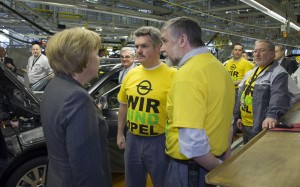Still smarting over General Motors’ decision to call off the sale of its German-based Opel subsidiary, government officials, in Berlin, have told the U.S. maker they won’t come up with any aid to keep Opel operating.
The Germans are also expecting GM to pay back the balance of a $2 billion bridge loan, provided earlier this year, to keep Opel from failing, government officials have confirmed.
The bad news was relayed to interim Opel CEO Nick Reilly, and GM’s international director, John Smith, during a meeting with German Economic Minister Rainer Bruederle.
While General Motors CEO Fritz Henderson said, this week, during a visit to Germany, that the automaker will cover a “sizable” share of Opel’s restructuring – and had also noted, recently – that the subsidiary’s finances are improving – GM is still hoping to raise additional money from some of the other European governments who have a stake in Opel’s survival.
On Tuesday, recently-reelected German Chancellor Angela Merkel told the lower house of the Bundestag, or parliament, that GM was going to be left to fend for itself. “This solution can only work if GM takes over the lion’s share of the restructuring costs, which also means that it has to pay back the bridging loan.”
The government had been sorely embarrassed after the collapse of a deal it had brokered, which would have led to GM selling off a majority stake in Opel to a consortium led by Canadian-based auto supplier Magna International and Russia’s Sverbank. Workers were also enraged when the sale collapsed, in part because they were to have gotten a 10% stake in the new Opel.
Union members staged a wildcat strike, last week, when GM announced it would keep Opel, and the powerful labor organization, IG Mettal has rescinded an offer of concessions that would have made the automaker more cost-competitive.
Berlin had offered an additional $6 billion in assistance if the deal was completed. Now, however, GM says it will need no more than $4.5 billion for the Opel restructuring, and it has already opened talks with the British and Spanish governments – which have Opel factories based on their soil – for assistance.
Both those countries had raised concerns about the GM-brokered Opel sale, as had officials from the Netherlands, who felt it would violate European Union rules. For one thing, it appears the Germans would have expected Opel to protect jobs in Germany, even though the carmaker’s factories in the U.K. and Spain are more efficient.
Following the decision to retain Opel, the subsidiary’s CEO Carl-Peter Forster tendered his resignation. He has been replaced, at least temporarily, by Reilly, who was running GM International, and had previously overseen Asia/Pacific operations. Reilly has been credited with taking the moribund Korean carmaker, Daewoo, and turning it into a successful GM subsidiary, the renamed GMDAT.
But despite the optimism expressed by General Motors, German officials have openly expressed a mixture of frustration and anger, in recent days. Economy Minister Bruederle told ZDF Television, on Sunday, that he is, “very skeptical whether the company, which handled this so badly, has new ideas overnight.”
Despite the seemingly recalcitrant position, some observers believe that, given the likelihood GM will have to cut as many as 10,000 Opel jobs, the German may, over time, still choose to come up with some financial assistance for the automaker.


Ah! Yet to another saga with the Germans holding GM to Blackmail because GM turned own Magna who had a deal with us i.e. Opel/Berlin government to give GM a loan to keep Opel open and shut other plants and make a majority of other nations redundant.
Therefore, GM decided to keep the plants, but possibly shut down the non-profit ones since they have seen their bottom. Well, GM should say we would shut all the plants, keep others open, and sell the non-profit ones as any land they may own. Who do the Germans think they are dictating who and what I thought? That is why two world wars were fought to stop this dictatorship and tyranny and open all up to a free world.